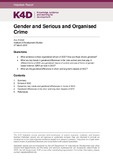| dc.contributor.author | Enfield, Sue | |
| dc.date.accessioned | 2019-04-02T15:18:52Z | |
| dc.date.available | 2019-04-02T15:18:52Z | |
| dc.date.issued | 2019-03-27 | |
| dc.identifier.citation | Enfield, S. (2019). Gender and Serious and Organised Crime. K4D Helpdesk Report 561. Brighton, UK: Institute of Development Studies | en |
| dc.identifier.uri | https://opendocs.ids.ac.uk/opendocs/handle/20.500.12413/14437 | |
| dc.description.abstract | The transnational and changing opportunities, as well as the attractive image of crime (with its connotations of wealth, power and freedom) seduce women into entering the criminal world. The changing character of organised crime provides women with new criminal markets and clients. Although women are frequently victims of the worst forms of organised crime, they also take part in criminal activities at varied levels. Female emancipation in legal spheres of societies are reflected in criminal activities undertaken by women, as women can have more active roles than are achieved legitimately in society. No evidence was found to show that women and men are differently motivated to engage in SOC. Much of the literature on crime analysed for this report traces the enduring historical view that crime was generally a man’s world, but one in which significant women became involved most commonly through kinship and relationships (e.g. girlfriends, mothers, sisters in law). These networks used to underpin the criminal world of Mafia style gangs allowing activity to be extended into other areas and ultimately across continents. As opportunities for crime have diversified women have taken a lead role in some crimes such as human trafficking, leading to the idea of gendered markets (Zhang et al., 2007). Many criminal roles are still dominated by men – enforcers, drug traders, gang leaders and bosses of organised crime groups, and yet women are almost always also found in some of these positions. The bigger picture is that the prevalence of men is much higher, and those who may claim that women play a prominent role in organised crime probably exaggerate the role of women. | en |
| dc.language.iso | en | en |
| dc.publisher | IDS | en |
| dc.relation.ispartofseries | K4D Helpdesk Report;561 | |
| dc.rights.uri | https://www.nationalarchives.gov.uk/doc/open-government-licence/version/3/ | en |
| dc.subject | Gender | en |
| dc.subject | Governance | en |
| dc.subject | Security and Conflict | en |
| dc.title | Gender and Serious and Organised Crime | en |
| dc.type | Other | en |
| dc.type | Helpdesk | |
| dcterms.dateAccepted | 2019-03-27 | |
| rioxxterms.funder | Department for International Development, UK Government | en |
| rioxxterms.identifier.project | K4D | en |
| rioxxterms.version | VoR | en |
| rioxxterms.funder.project | 238a9fa4-fe4a-4380-996b-995f33607ba0 | en |

